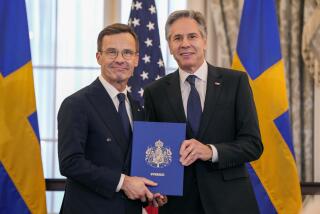Nordic Nations Are in Turmoil Over EC
- Share via
STOCKHOLM — For decades, neutral Sweden and Finland never considered entering the Common Market.
Now, the end of East-West rivalries and the prospect of economic difficulties ahead may combine to bring the countries on Europe’s northern tier in from the cold.
Several weeks ago, the image of Nordic self-sufficiency and disengagement suddenly came apart. Sweden announced its intention to join the European Community and angered Finland by calling for a joint Nordic application.
In Norway, where voters said “no” to membership in a referendum 18 years ago, the governing coalition collapsed when its smallest partner opposed trade negotiations with the community. The new Laborite government favors the talks.
Of the other two Nordic nations, Denmark already is a member, while Iceland is opposed to joining.
Foreign Minister Sten Andersson says the end of the Cold War and the prospects for a new all-European security system clear the way for neutral countries like Sweden to join the European Community.
Observers have called Sweden’s intention to join the community the biggest turnaround in Swedish foreign policy since shortly after World War II.
Wilhelm Agrell, a leading security policy expert, called it “the most important political crossroads since 1948-49,” when Sweden tried to organize a Scandinavian defense association.
The government’s change of position was announced in an emergency economic package presented last week, and observers agreed it was forced by economic concerns. The package itself made major changes in domestic policy, deeply cutting the welfare system the Social Democratic Party built.
Economic observers said the “declaration of intention” to join the Common Market was an attempt to calm Swedish industry, which has made massive investments in community countries.
The Swedish concerns do not want to be closed out of their main export market in 1993, when community nations are to unite in economic union.
The investments had caused a large outflow of Swedish currency, intensifying a drop in the krona’s strength and an increase in devaluation speculation before the package was announced.
The Swedish announcement caused consternation at the European Community’s Brussels headquarters and among fellow European Free Trade Assn. countries, which are currently negotiating an agreement that would link the two trade groups.
Critics say the Swedish initiative renders the negotiations--which also involve Norway, Finland, Iceland, Austria and Switzerland--pointless.
Finland, an avowedly neutral country with traditionally strong ties to the Soviet Union, has recently begun discussing future European Community membership.
Soviet President Mikhail S. Gorbachev said a year ago that Moscow would not object to Finland joining the community.
But when Andersson was quoted as saying that Nordic countries could start discussing a joint European Community application next year, Finland’s President Mauno Koivisto said the statement was premature.
Risto Penttila, a researcher at the Finnish Foreign Policy Institute, said that Finland could be in a problematic position in the future if there is friction between the Soviet Union and the European Community.
Finland shares a long common border with the Soviet Union.
For their part, Norwegians appear to be warming to the idea of European Community membership.
A poll of 607 people conducted by the MMI survey institute in late October showed 38% favored membership, 33% opposed it and 29% were undecided. No margin for error was given.
More to Read
Sign up for Essential California
The most important California stories and recommendations in your inbox every morning.
You may occasionally receive promotional content from the Los Angeles Times.













